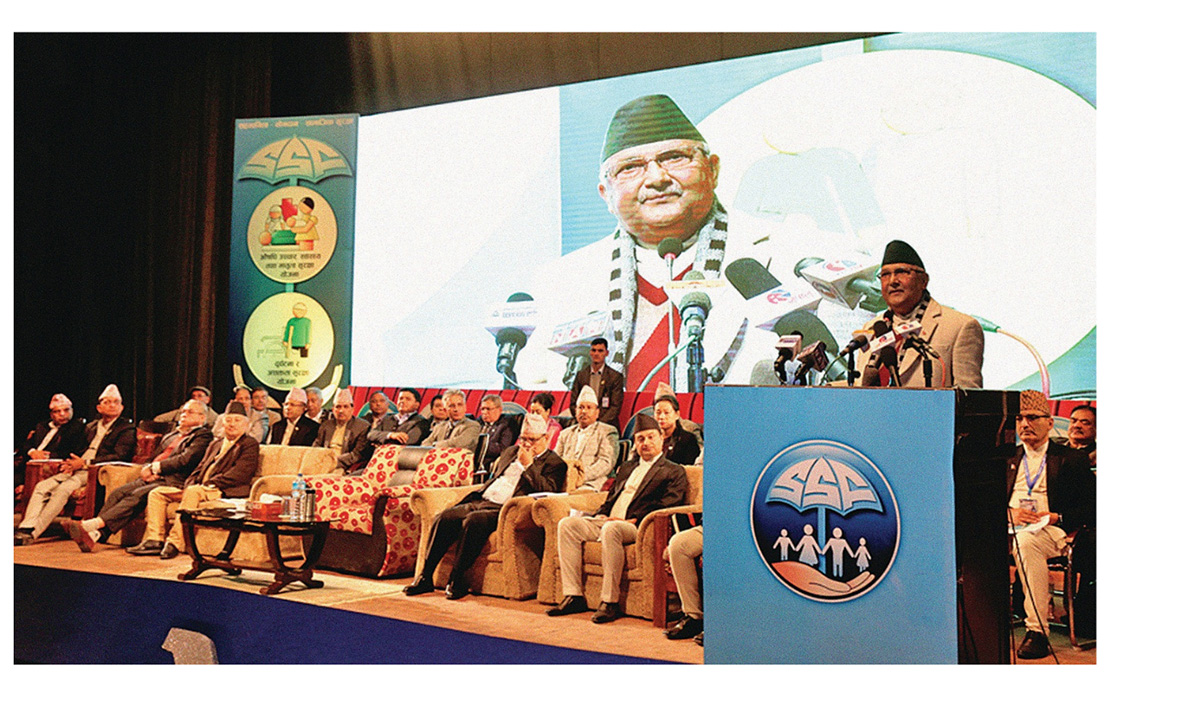
The government launched the Social Security Scheme on November 27 termed a game changer in the lives of 3.5 million formal sector workers in the country. The scheme will protect workers nationwide and promises them a comprehensive welfare package that entitles them to old age pension, medical treatment, health protection, maternity coverage and accident and disability compensation. An amount equivalent to 31% of the workers’ basic monthly salary constitutes 11% deducted from the employee monthly salary and 20% as employer contribution. The scheme is in accordance with the contribution-based Social Security Regulation. While the Scheme has been welcomed alike by workers and employers, a huge concern lies in its implementation and fund management.
In this edition of Business 360, we have brought together the opinion of various thought leaders on the Social Security Scheme and what it means for Nepal.
Dr. Gandhi Pandit Senior Advocate, Founding Partner, Gandhi & Associates
The Government of Nepal has recently implemented the contribution-based social security scheme for formal sector workers which the government hopes to add new dimension to social security scheme as envisaged by the new Constitution of Nepal.
The scheme is hoped to enhance and strengthen the industrial relations between worker and employer and it is believed to help bridge the gap between the government employee and private sector employees as private sector employees, until today, are not able to gain benefit when compared to government employees. With the introduction of Social Security Scheme, the private sector employee will also be entitled to permanent pension if they contribute to the fund regularly for 15 years.
It is evident this scheme is going to guarantee social security to all employees who contribute to the fund. This law requires the private sector employee to contribute 11% of its basic salary to the fund. Similarly, an employer will have to contribute 18.33% (10% as provident fund and 8.33% as gratuity per month) in the employee’s account, which is going to be operated and managed by the Social Security Fund.
Every coin has two parts. The same applies to social security scheme as well. However, there is a huge suspicion on the part of employers in regard to its sustainability and endurance.
Employers consider this scheme one-sided as it only addresses the issue, concern and worry of employees. The employers are not sure whether such scheme is suitable in relation to the current economic growth where inflation is so high. Nevertheless, they are pleased to support this scheme. It is also necessary to look at the need and concern of the employer. For example, if an employee gets sick and if s/he completes 15 years of employment, s/he is secured to get all the benefit and financial protection. What about the employer who contributes 18.33% to the welfare of the employee? Should not the concerns of the employee be addressed by the government so that they are assured financial help and support from the government during the operation of the enterprises? When laws give minimum financial security to employees, should not an employer expect the same type of financial security at the time of financial distress to the enterprise?
Dr. Bijay KC Dean, Kathmandu University School of Management (KUSOM)
With much fanfare the government has announced a contribution-based Social Security Scheme providing four types of security to the employees and workers that include accidental and disabled benefits, medical, health and maternity benefits, old-age and dependent family member’s benefits etc. Claimed by the government as a major historical event marking the beginning of a new era, the scheme seems well appreciated by the workers’ organisations and trade unions.
One of the critical issues about the scheme is its funding. It is to be funded by the contributions made by the workers and employers. While workers contribute 11% of their basic salary, employers contribute 20% of the workers’ basic salary. This will apparently add cost to the employers and increase the cost of doing business in Nepal. The matter is crucial as Nepal is not well positioned in this respect in the global ranking. This can also have adverse effects on foreign direct investment. Besides, employers will also pass the impact of their contributions to the consumers. This can lead to higher prices of the goods and services in the market causing the inflation rate to rise. Furthermore, the contributions to be made by the workers mean lesser amount of money left with the workers and erosion in their purchasing capacity. With the already low level of per capita wages for majority of workers, this indicates hardship they have to face presently for the benefits in the future.
As it is understood, there is no financial contribution to be made by the government towards the scheme. The role of the government is limited to the management of the funds and implementation of the scheme. This can be a serious problem considering the weak implementation mechanism of the government. How effectively and efficiently the scheme will be implemented by the government is a big question. With no adequate data base, weak infrastructure particularly regarding the IT capacity, rampant corruption, a culture of lack of accountability, ill-trained staff, all raise doubt on the capacity of the government to implement the scheme efficiently.
Countries which have focused more on the distribution of wealth than on its creation have invited major financial crisis in the long-run. With the ballooning trade deficits in the recent years, it is necessary for us to emphasise more on the ways to increase production than on the adoption of populist measures which will drain the country’s resources.
Shekhar Golchha Sr Vice President, Federation of Nepalese Chambers of Commerce and Industry (FNCCI)
The contribution-based social security scheme announced by the government is an important step towards delivering social justice, and it is expected to protect people employed in the private sector.
Under the new scheme, private companies will no longer need to pay for provident fund and gratuity of their employees. Instead, they will have to deposit 31% of the basic salary of each employee — 20% from the employer and 11% from the worker — into a government-owned social security fund. Private sector employees will get their pension and other facilities from this fund.
The employers will now have to pay 1.67% more than what they have been paying for provident fund and gratuity of their employees. But we, the employers, are not unhappy. Our only concern is an adjustment of the government-fixed basic salary of employees. About 550,000 people are currently employed by businesses, and they will all be covered by the scheme in its first phase. But will the mechanism for the social security fund be able to serve such a huge number of clients, and won’t the government now have more liability? When the informal sector is also brought under this scheme, the number of beneficiaries and their deposits will increase tenfold. Can the government afford this outlay?
The money deposited in the social security fund will keep growing. Where and how will the government invest this money? As of now, the employees’ provident fund and gratuity are controlled by not just government agencies, but also the employers. Employees cannot withdraw their money without a letter from the employers. Under the new scheme, employers need not keep records of provident fund and gratuity. The money will be controlled by the government.
The government will now be solely responsible for social security of private sector employees. The employers are just responsible for adding 20% of basic salary. What if the government loses the data of employees registered in the social security fund? How will the employees recover their money? The government now has a legal structure for social security, but it should not waste time in developing an administrative and technical structure to implement this scheme.
Hari Bhakta Sharma President, Confederation of Nepalese Industries (CNI)
We agreed on the proposed scheme based on long negotiation with trade unions in presence and absence of the government. I am happy and satisfied that workers will raise their products and services at par with international standards. Social Security Scheme will likely bring peace and innovation. Further, this will propel more industries to generate capacities, improve productivity and enhance employees’ contribution.
We support it primarily with the hope that it will improve working environment in industries, provide more number of opportunities, improve labour industry and relations between workers and employers.
However, informal sector should be brought into the formal sector to have louder impact. Most importantly, we hope this will improve the trade gap in Nepal’s industrial outcome.
There could be some challenges for the government when the funds are being used, so it needs to be properly managed. Moreover, government should also come forward to help by investing in it. However, I suggest the government to invest the money collected in the Social Security Fund in physical infrastructure and productive sector.
Purushottam Ojha Former Secretary, Government of Nepal
Implementation of a judicious Social Security Scheme (SSS) was a long cherished goal of the trade unions of Nepali wage workers. In order to protect workers from the employers’ arbitrary decision, the discourse on labour flexibility in the manufacturing units have always been hinged with the social security scheme. The announcement of SSS by the government serves as a milestone for maintaining a harmonious industrial relation by alleviating fears of uncertainties among workers and employees on their compensation and old age benefits.
There are multiple benefits of the scheme: first, it will help to assure employees and workers on secured benefits and fair compensation for their work; thereby,reducing conflict in the workplace and increasing productivity of the workers; second, there will be additional incentives for the young people to remain in the country rather than going to Gulf countries and Malaysia for employment; third, employees and workers could avail their benefits from a single organisation without the need of moving from pillar to post; fourth, it will help in gradual phasing out of the other cash transfer schemes like senior citizen, and single women allowance, disability allowance and maternity care allowances once the new scheme gets to maturity; and fifth, the scheme paves way for productive use of the large funds deposited with the government in the name of Central Welfare Fund (Rs 19 billion) and Social Security Fund (Rs. 18 billion). Another important feature is that the scheme is wholeheartedly supported by the representatives of the private employers’community, particularly Confederation of Nepalese Industries and the Federation of Nepalese Chamber of Commerce and Industries.
But still implementation is a challenge. The scheme aims to achieve 100% geographical coverage within May 2019 which seems too ambitious. Setting all the components and parts in place requires an effective and functioning organisation that should be able to handle complex tasks of bringing all employers, employees and workers within a single organisational platform. Besides, the task of handling large number of claims, their processing and verification for preventing fraudulent practices requires effective regulatory mechanisms. I feel the best way would be going for a phased implementation, piloting the scheme in the first year with the goal of reaching to full blown implementation within 3-5 years.
Basant K. Chaudhary Chairman, BL Conglomerate
The recent declaration of a social security scheme can prove to be a boon for an economically deprived country like Nepal. Virtual absence of a social safety network in the third world has made life an ordeal for the respective populations. Prime Minister K P Sharma Oli has described the new scheme as the ‘beginning of a new era.’ The pronouncement is expected to generate hope and inspiration among the underprivileged sections.
Though the exact details of the scheme are not clear yet, the contributory character of the plan makes both employees and employers active stakeholders in this welfare measure. Sound economics always prescribes sharing formula in contrast to doles, subsidies and freebies. Sharing inspires employers and employees to put their best foot forward. A symbiotic working relationship develops. Mutual trust strikes roots. As a result, productivity rises.
However, execution is the key to the success of even the best of plans.The scheme demands a new work culture and a new mindset across the society. Will our people and particularly, the government officials and supervisors, rise to the occasion? Change has not always been welcomed in most societies especially when it impacts social structures and hierarchy. Vested interests feel threatened and continue to oppose social welfare measures. But those at the bottom of the society need to display their grit and resolve to gain their justifiable due.
The Prime Minister is reaching out directly to his people with this scheme. Promotional advertising does not do justice to the sensibilities of the common people who tend to look on these declarations with cynicism.
We would have wanted a start that resonated more for a new social welfare era!
Krishna Gyawali Former Secretary, Government of Nepal
The government has launched Social Security Scheme with glaring fanfare. This is a laudable initiative given that the country’s constitution recognises the state as being “oriented and committed to socialism” and has also enshrined the principles of welfare state in its fundamental rights and directive principles. But the launching itself is not a guarantee for its effective implementation.
Social security principally covers the whole lot of people who cannot take care of themselves, such as economically deprived and vulnerable including the poor, single women, children and the disabled. Their respective fundamental right is guaranteed in Article 43 of the Constitution. But the current scheme is targeted to the employees in any registered, formal entities, both public and private. The Article 34(2) of the Constitution in its “Right to Labour” stipulates that each labourer will be entitled to the right of contributory social security along with reasonable pay and perks. That means employees have to contribute certain amount of his/her salary a month to be eligible for such benefits. The current scheme fixes such contribution as 11% of the basic monthly pay of the employee which will be supplemented by another 20% equivalent of the salary from the employer. This will be deducted and deposited in the Social Security Fund. Note that the labourer here is not limited to menial workers alone but includes the so-called ‘white collar’ professionals also.
The current package of the scheme generously covers all necessary benefits including medical and accidental expenses during the service and the pension after the retirement. This is appreciable.
The main challenges for its success and sustainability are twofold: the need to bring informal sector workers into its fold (one estimate says that only three million workers are attached to the 932,000 registered private sector entities, so a large chunk will still remain outside of its fold), and the commitment to honour the deduction scheme both by the workers and the employers (what will happen if both stop deducting under one or another excuse?). The government needs to continuously regulate and monitor its implementation and troubleshoot any bottlenecks for its sustained continuity.
Lastly, the government deserves credit for its launch but the manner in which it was done was simply a vulgar display of narcissism or megalomania. Likewise, it was brought out as if it was an abrupt overnight invention. It is rather an outcome of the last three years’ persistent efforts by all sincere bureaucrats and political executives who should also be equally complimented for initiating and leading the process. Sharing due credit to all deserving only glorifies the government’s deed.
Suraj Vaidya President, Vaidya’s Organisation of Industries and Trading Houses (VOITH)
The government’s announcement of the Social Security Scheme is a new milestone that promises to secure formal sector workers. It is a widely popular program in most developed countries such as USA, Australia, Canada, Finland. In Nepal, over three million people are expected to benefit from this scheme within five years, and it ensures some of the fundamental rights mentioned in the new Constitution. However, more than 85% percent people will remain out of this program as only 16% are formal paid employees.
While the scheme ensures quality of life for workers, it also impacts productivity and industrial peace for employers. This scheme should also encourage more young people to work in the country rather than seek livelihoods abroad. This way, skilled workers will ultimately contribute to the country’s economy, foster social relations and maintain labour cost. The government must, however, channelise fund management to productive areas and this remains a key concern.
Dr. Jeeban Amgain Researcher, Daayitwa
The recently launched contribution-based Social Security Scheme of the government is pleasant news for long-term workers in the formal sector. Besides, it is also expected to bring positive vibe in the economy if it is managed well. The model of the scheme itself is excellent as it has covered the components of both insurance and pension plans.
Having said that, the scheme is still unclear in explaining the social security aspect of the large number of short-term and part-time workers in Nepali job market. The scheme has provisioned to receive pension after the age of 60 conditioned that employment duration surpasses 15 years of employemnt. Those who work for about 4/5 years at the early ages and start their own business would not get the true benefit of the security scheme.
There may be another major issue to be addressed on the private sector side while implementing this scheme. As per the scheme, employers have to transfer a huge amount of fund, 20% of the employees’ basic salary, which may become an extra burden to the employers. This may lead to negative policy implications. The employers’ cost of production becomes high and it may be problematic to sustain labour-intensive businesses. To tackle this, employers in private sector may either start lessening the salary of the employees so as to compensate the amount that goes to government’s social security fund or transfer nominal amount of fund which coincides the rule of minimum wage. As a result, the net benefit that the employees receive will be insignificant. If the government strictly forces private companies to allocate the amount for employees’ security fund, entrepreneurship could be discouraged unless the productivity of the workers rises significantly. Hence, the government has to set some supplementary schemes co-axially and other measures as well to reap the full benefits of the social security scheme.
Ashutosh Tiwari Managing Director, Safal Partners
In theory, the intentions are good. But the fund’s relevance boils down to its execution: how the money will be collected, how it will be sorted and saved, how it will be invested and how it will be distributed to pensioners. It is not clear who and what sort of people will be the fund managers and where and how they will invest the collected funds. Will the government run the fund or will it contract out the management to seasoned external professionals with accountability to the government?
We have seen how other funds such as those meant for the welfare of migrant workers not being used effectively. My fear is that those in power may see the fund as another box into which they can dip for money to pay for all sorts of expenses just like how things have been at some of the other government-supported investment funds. Private sector companies may see this whole thing as an additional burden, and may invest in technology that lowers the need for more workers. They may also just hire fewer workers. Some may find the cost of doing business too high, and slide back into the informal sector for mere survival. In Nepal, bureaucracy deters most people from accessing public services meant for them. If the burden of paperwork is too high for pensioners, they may not be too enthusiastic about the whole thing. Personally, I would have preferred for the government to first lay out sensible national plans to earn a bigger income for all, say, by making it logistically easier to export goods to other countries, and by reducing trade barriers. Once such plans get going, then, let there be an experiment of the pension scheme in one or two sectors – say, tourism and hydropower for two years -- collect the lessons, and then roll out the improved plan for all the sectors.






